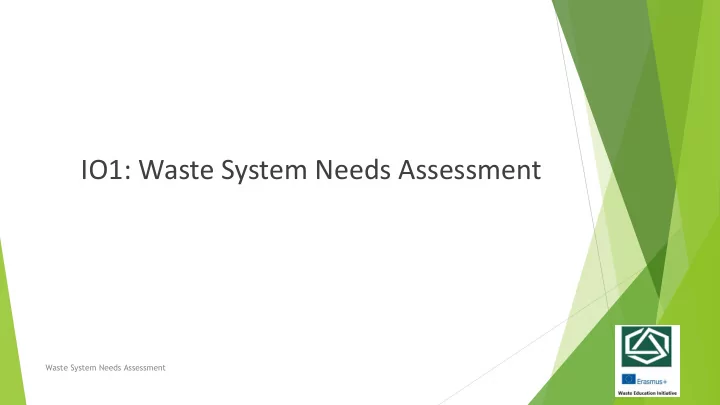

IO1: Waste System Needs Assessment Waste System Needs Assessment
IO1 Aims • Review of existing waste management infrastructure in the five regions • Map out current practice • Identify obstacles to current performance • Provide a benchmark of current waste education – the questionnaire Waste System Needs Assessment
Population and geographical area of each region 3000000 1400 1200 2500000 1000 2000000 800 Population Area (km 2 ) 1500000 600 1000000 400 500000 200 0 0 Bucharest Hamburg Greater Manchester Tallinn Zagreb Population Area km2 Waste System Needs Assessment
Waste collected/recycled in each region 1400000 1200000 1000000 Waste and Recycling (tonne/year) 800000 600000 400000 47% 47% 200000 14% 30% 15% 0 Bucharest Hamburg Greater Manchester Tallinn Zagreb Recycled Waste Non Recycled Waste Waste System Needs Assessment
Bucharest, Romania Waste Infrastructure • Residual waste 2-3/week Landfill Recycling Rate 14% No kerbside collection for recycling • WEEE collection 3 times/year • • Construction disposal at a cost to residents Pilot project: 1000 Collection Points for dry recycling • (paper, card, glass, plastic and metal) Future Up to 3 incinerators to be built by 2020 using EU • funding Obstacles to current Small to no recycling infrastructure • Performance • There is a need for recycling education schemes Waste System Needs Assessment
Hamburg, Germany Waste Infrastructure All kerbside; Recycling Rate (47%) • Paper and card Monthly Waste treatment plant Metal and plastic 2 weeks Waste treatment plant • Bottle bank Monthly Waste treatment plant • Bio-waste 2 weeks Bioenergy Plant • Non recyclable 2 weeks Incinerator • • Rejected waste is landfilled Future Center for Resources and Energy (due 2022) for the sorting of residual waste, biowaste fermentation, biomass combustion, substitute fuel combustion and bio gas preparation. The center is a significant climate neutral contribution to the future heat supply of Hamburg. Obstacles to current • Contamination Performance Adaption of the Circular Economy (especially WEEE) • Waste System Needs Assessment
Greater Manchester, UK Waste Infrastructure All kerbside (collection – using MCC as example); Recycling Rate (47%) • Paper and card 2 weeks Sorting facility Glass, metal & 2 weeks MRF • plastic bottles Food & garden 1 weeks In-vessel composter • • Non recyclable 2 weeks Energy recovery Up to 12% is landfilled Bulky/WEEE/batteries etc. Household Waste • Recycling Centres Future • New contract in February/March 2019. Deposit return scheme has been approved. • Obstacles to current Contamination • Performance • Plastics – numerous types, light weight, no sorting/reprocessors. Compostable and biodegradable - alternatives to plastics, • but the disposal route hasn’t been considered causing confusion. • Reliance on overseas markets , lack of funding in UK Waste System Needs Assessment
Tallinn, Estonia Waste Infrastructure All kerbside; Recycling Rate (30%) • Paper and card 1-2/week Recycling facility Glass 1-2/week Recycling facility • • Mixed packaging 1-2/week Recycling facility Food 1-2/week Tallinn RC Composter • • Non recyclable 1-3/week Energy recovery facility Beverage packaging Deposit return scheme • Future Obstacles to current Performance Waste System Needs Assessment
Zagreb, Croatia Waste Infrastructure Kerbside Recycling Rate (15%) • Paper and card 2 weeks Recycling facility • Plastic bottles 2 weeks Recycling facility Non recyclable 2/week Landfill & recovery • • Bulky waste On demand Non-kerbside • Food 1 week Mostly market/malls Future • Door-to-door for paper, plastic/metal and biowaste Obstacles to current Sorting facility required for paper and plastic/metals • Performance • Lack of treatment facilities for separate waste collection Lack of biowaste treatment plant – biogas plant • Waste System Needs Assessment
Waste System Needs Assessment Tool Recycling Infrastructure Collection Kerbside None Site Waste System Needs Assessment
Recommend
More recommend